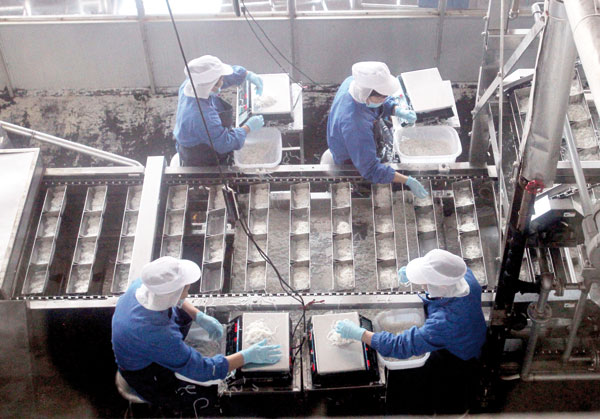

Industries and cities in the central China province connect around the world
The factory floor in Changsha reverberates with the thunderous rumble of mysterious machinery, relentless robotic arms turning out enough building material every 72 hours to make an entire skyscraper. Somewhere in Russia, and in parts of Africa and South America, the pieces of prefabricated concrete wall the factory spits out will become offices and homes.
In a cavernous workshop in Zhuzhou, technicians swarm over the carapaces of new electric trains, assembling and outfitting rigs that will ride the rails across China and other lands.
|
 Workers weigh rice in a rice processing plant in Changde. Photos by Wang Jing / China Daily
|
On the floor of a warehouse in Xiangtan, giant wind turbines wait. Already the engines of a greener China, from next year, they will claw at French skies and power their homes.
In a processing plant in Changde, men and women in white coats oversee a river of rice products that will feed people in Europe and South-East Asia.
And on the docks in Yueyang, men with weathered faces load ships that will take goods down the Yangtze River to Shanghai and across the sea.
These five cities, linked to each other and increasingly connected to all corners of the globe, are located in one Chinese province. This is Hunan, where pieces of your world are made every day.
Rich in ancient and modern history, Hunan is home to a group of prominent figures who went on to change and shape China, Mao Zedong foremost among them. But while citizens, leaders and industry kingpins are proud of their region's past, all eyes are now on Hunan's future.
Change and innovation are taking shape behind the often-closed doors of the region's big businesses, presenting opportunity and competition alike for the rest of China and the world.
Located in China's sub-tropical monsoon zone along the middle reaches of the Yangtze River, boasting a population of about 72 million, Hunan has one of the most dynamic economies in the central and western regions. Last year, its GDP of more than 2.2 trillion yuan ($362 billion) and average growth rate of 13.3 percent placed it in China's top 10 performing provinces for the fifth consecutive year.
Xie Jianhui, director-general of the Hunan Commerce Department, says between January and September this year, the province's GDP reached 1.69 trillion yuan, a year-on-year growth of 10.2 percent.
But China, and the world, is changing. While Hunan is an economic powerhouse, local officials realize they have to change with the times, or face being left behind. Xie says as a result of this forward-looking mentality, Hunan is increasing becoming a global trader with bilateral investment links to a range of countries.
During the first three quarters of this year, Hunan's total volume of import and export reached $17.17 billion, she says. "With a year-on-year growth of 18.4 percent, the growth rate (in import and export) ranks first in central China."
Europe is fast becoming a key location for Hunan's outbound investment, Xie says. Eighty-one enterprises in the province have invested a total of $733 million in the EU.
But the lion's share of the province's total foreign investment still goes to Asia.
"We have 529 enterprises that have invested in the Asian region, accounting for more than 60 percent of all the enterprises in Hunan that have invested overseas," she says. "The total contracted investment has now reached $4.02 billion. The major countries and regions that our enterprises have invested in are Hong Kong, Laos, Vietnam, and Thailand.
 Lamborghini launches Aventador LP 720-4 50° Anniversario
Lamborghini launches Aventador LP 720-4 50° Anniversario
 Dongfeng Renault expects 1st China-made Renault SUV in H1 2016
Dongfeng Renault expects 1st China-made Renault SUV in H1 2016